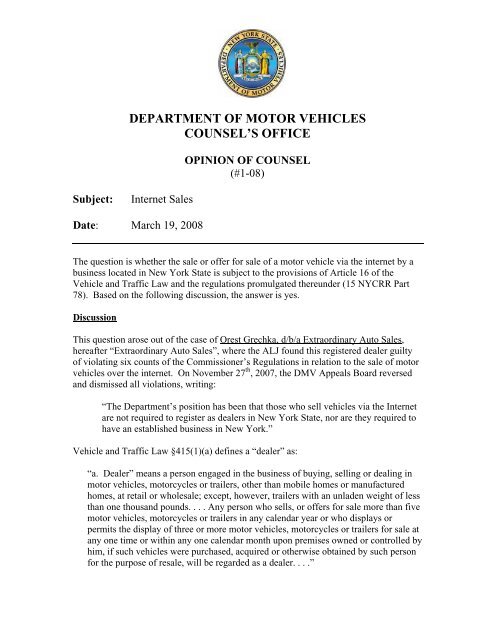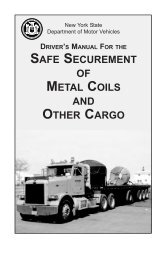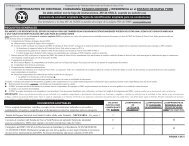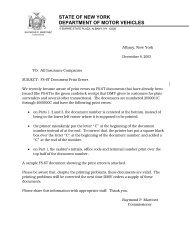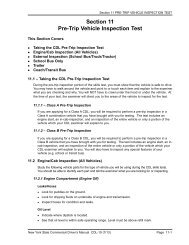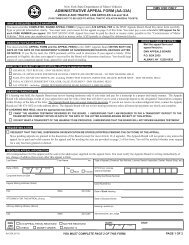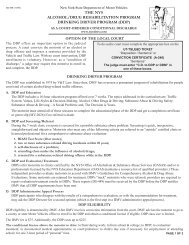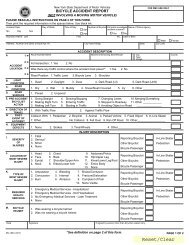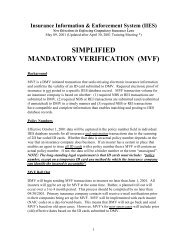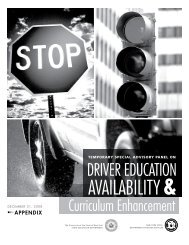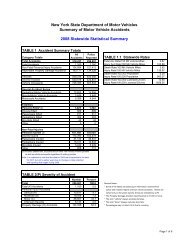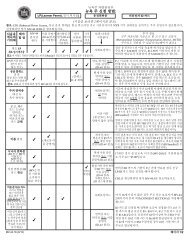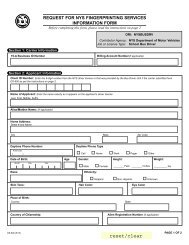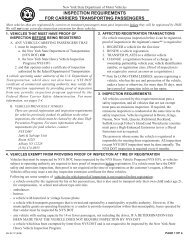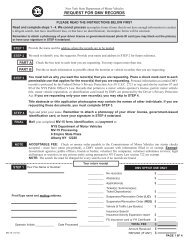Internet Sales of Motor Vehicles (Opinion 1-2008) - DMV - New York ...
Internet Sales of Motor Vehicles (Opinion 1-2008) - DMV - New York ...
Internet Sales of Motor Vehicles (Opinion 1-2008) - DMV - New York ...
Create successful ePaper yourself
Turn your PDF publications into a flip-book with our unique Google optimized e-Paper software.
DEPARTMENT OF MOTOR VEHICLES<br />
COUNSEL’S OFFICE<br />
OPINION OF COUNSEL<br />
(#1-08)<br />
Subject:<br />
<strong>Internet</strong> <strong>Sales</strong><br />
Date: March 19, <strong>2008</strong><br />
The question is whether the sale or <strong>of</strong>fer for sale <strong>of</strong> a motor vehicle via the internet by a<br />
business located in <strong>New</strong> <strong>York</strong> State is subject to the provisions <strong>of</strong> Article 16 <strong>of</strong> the<br />
Vehicle and Traffic Law and the regulations promulgated thereunder (15 NYCRR Part<br />
78). Based on the following discussion, the answer is yes.<br />
Discussion<br />
This question arose out <strong>of</strong> the case <strong>of</strong> Orest Grechka, d/b/a Extraordinary Auto <strong>Sales</strong>,<br />
hereafter “Extraordinary Auto <strong>Sales</strong>”, where the ALJ found this registered dealer guilty<br />
<strong>of</strong> violating six counts <strong>of</strong> the Commissioner’s Regulations in relation to the sale <strong>of</strong> motor<br />
vehicles over the internet. On November 27 th , 2007, the <strong>DMV</strong> Appeals Board reversed<br />
and dismissed all violations, writing:<br />
“The Department’s position has been that those who sell vehicles via the <strong>Internet</strong><br />
are not required to register as dealers in <strong>New</strong> <strong>York</strong> State, nor are they required to<br />
have an established business in <strong>New</strong> <strong>York</strong>.”<br />
Vehicle and Traffic Law §415(1)(a) defines a “dealer” as:<br />
“a. Dealer” means a person engaged in the business <strong>of</strong> buying, selling or dealing in<br />
motor vehicles, motorcycles or trailers, other than mobile homes or manufactured<br />
homes, at retail or wholesale; except, however, trailers with an unladen weight <strong>of</strong> less<br />
than one thousand pounds. . . . Any person who sells, or <strong>of</strong>fers for sale more than five<br />
motor vehicles, motorcycles or trailers in any calendar year or who displays or<br />
permits the display <strong>of</strong> three or more motor vehicles, motorcycles or trailers for sale at<br />
any one time or within any one calendar month upon premises owned or controlled by<br />
him, if such vehicles were purchased, acquired or otherwise obtained by such person<br />
for the purpose <strong>of</strong> resale, will be regarded as a dealer. . . .”
2<br />
Vehicle and Traffic Law §415(1)(b) defines a “person” as:<br />
b. “Person” means any natural person, firm, corporation, partnership, limited<br />
liability company, entity, joint venture, association or organization.”<br />
It is the opinion <strong>of</strong> Counsel’s Office that any person located in this State who meets the<br />
definition <strong>of</strong> “dealer” as defined in 415 (1) (a) (above), must register as a dealer regardless<br />
<strong>of</strong> whether such sales are transacted in person or via the internet, and that all such sales are<br />
subject to the provisions <strong>of</strong> Article 16 <strong>of</strong> the Vehicle and Traffic Law and 15 NYCRR Part<br />
78.<br />
In People v. Lipsitz, 174 Misc.2d 571, at 577(<strong>New</strong> <strong>York</strong> Co. Sup. Ct. 1997), a business<br />
located on Staten Island sold magazines over the internet. The Attorney General’s Office<br />
charged the business with fraudulent activity and false advertising. In considering<br />
whether the court had jurisdiction over the case, the court wrote, in part:<br />
“The first jurisdictional consideration is whether the litigation target has<br />
established a physical presence or a sufficiently close equivalent in the<br />
jurisdiction. Such a physical presence is not established, for example, by merely<br />
maintaining an <strong>Internet</strong> site accessible by an individual in a given jurisdiction. As<br />
recognized by Magistrate Peck in Hearst Corp. v Goldberger (1997 WL 97097, 1<br />
[SD NY, Feb. 26, 1997]), "a finding <strong>of</strong> personal jurisdiction in <strong>New</strong> <strong>York</strong> based<br />
on an <strong>Internet</strong> web site would mean that there would be nationwide (indeed,<br />
worldwide) personal jurisdiction over anyone and everyone who establishes an<br />
<strong>Internet</strong> web site. Such nationwide jurisdiction is not consistent with traditional<br />
personal jurisdiction case law nor acceptable to the Court as a matter <strong>of</strong> policy"<br />
(see also, in accord, Bensusan Rest. Corp. v King, 937 F Supp 295 [SD NY 1996,<br />
Stein, J.]). However, where a person or business conducts a business within the<br />
forum State by being a subscriber to a local <strong>Internet</strong> service provider and selling a<br />
product through that provider, jurisdiction is proper (CompuServe, Inc. v<br />
Patterson, 89 F3d 1257 [6th Cir 1996]; see also, as to varying tests for tort and<br />
intellectual property claims, EDIAS S<strong>of</strong>tware Intl. v Basis Intl., 947 F Supp 413<br />
[D Ariz 1996]; California S<strong>of</strong>tware v Reliability Research, 631 F Supp 1356 [D<br />
Cal 1986]; Playboy Enters. v Chuckleberry Publ., 939 F Supp 1032 [SD NY<br />
1996]). Here, respondent is physically located within the jurisdiction.”<br />
Similarly, in the “Extraordinary Auto <strong>Sales</strong>” case, the dealer was located in this State and<br />
transacted business in this State via the internet. Thus, <strong>DMV</strong> clearly had jurisdiction over<br />
its sales transactions. Applying the logic <strong>of</strong> the Lipsitz decision, <strong>DMV</strong> would also have<br />
jurisdiction over a “person” who conducts business over the internet as a dealer but has<br />
failed to register as a dealer. <strong>DMV</strong> could pursue an “unregistered dealer” investigation<br />
against such an entity as we do against such unregistered dealers who perform traditional<br />
“in-person” transactions.
3<br />
The Appeals Board, in the “Extraordinary Auto <strong>Sales</strong>” case, may have relied upon a letter<br />
written by Counsel in 2000, advising Piaggio USA that “those who sell motor vehicles<br />
via the internet are not required to register as dealers in <strong>New</strong> <strong>York</strong> State”. Piaggio USA,<br />
a subsidiary based in <strong>New</strong> <strong>York</strong>, facilitated the sale <strong>of</strong> Vespa motor scooters, made in<br />
Pontedera Italy by Piaggio & C. S.p.A, to <strong>New</strong> <strong>York</strong>ers and other Americans. The<br />
scooters would be ordered from the internet or a catalog, and shipped from Italy.<br />
The subsidiary itself apparently never had physical possession or ownership <strong>of</strong> any <strong>of</strong> the<br />
scooters, but only represented the Italian company in the United States. At that time, it<br />
did not appear that Piaggo USA intended to establish a place <strong>of</strong> business in NYS to sell<br />
the scooters. Therefore, because the Italian manufacturer had no intention <strong>of</strong> establishing<br />
a business in this State, there was no basis to require dealer registration merely based<br />
upon internet and catalog sales to <strong>New</strong> <strong>York</strong>ers via the internet.<br />
In conclusion, it is the opinion <strong>of</strong> Counsel’s Office that any person registered or required<br />
to be registered as a dealer under Section 415 <strong>of</strong> the Vehicle and Traffic Law that sells<br />
vehicles over the internet must comply with such section and all relevant regulations set<br />
forth in 15 NYCRR Part 78 and, consequently, is subject to enforcement actions by the<br />
Department for violations there<strong>of</strong>.<br />
NWS/ILT/cs


